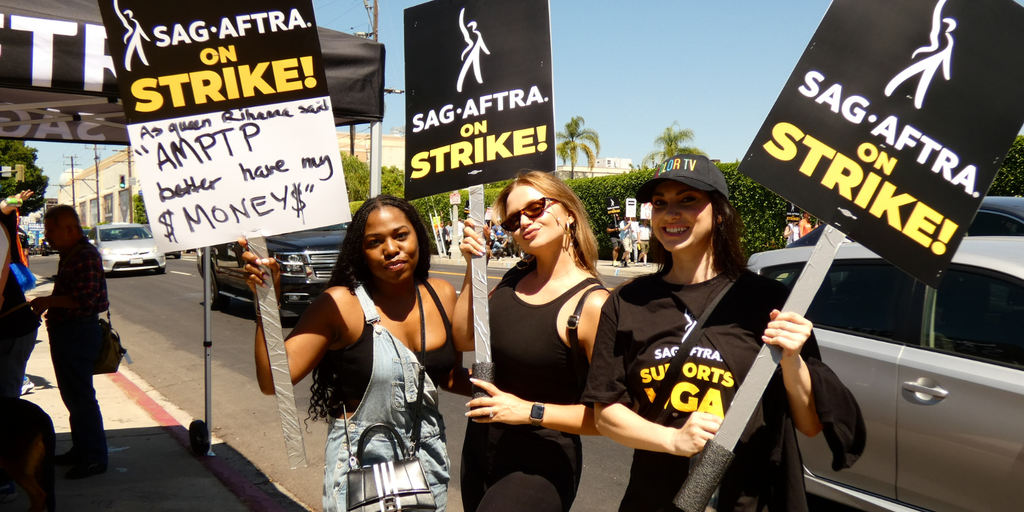### Summary
A new episode of Netflix's "Black Mirror" explores how celebrities will contend with AI replicas, raising concerns about regulations and potential brand risks. The use of AI-generated replicas has already been a topic of discussion among actors and performers, who are demanding better protections. This development could also have implications for regular people managing their own digital likenesses.
### Facts
- The latest episode of "Black Mirror" focuses on a woman named Joan who discovers a show on a streaming platform that features a digital replica of her, portrayed by actress Annie Murphy.
- Actors have been striking to demand protections from studios regarding generative AI, including regulations for AI-generated replicas.
- Some celebrities are considering the coexistence of their AI replicas, which could bring new monetization options but also increase brand risks.
- The use of AI-generated replicas may extend to regular people, as companies like Soul Machines offer products for designing autonomously-animated digital persons.
- Soul Machines has created digitized versions of celebrities like Carmelo Anthony, Mark Tuan, and Jack Nicklaus.
- Another company called Hyperreal allows individuals to create digital versions of themselves for future generations.
### Loading
Something is loading.
### Summary
Actor Eric Roberts has discussed the idea of selling his image and vocal rights to an AI firm, following in the footsteps of Bruce Willis, in order to preserve his legacy and avoid potential deterioration due to illness.
### Facts
- Eric Roberts described himself as a "showbusiness prostitute," expressing his openness to selling his image and vocal rights to an AI firm.
- Bruce Willis has already sold his perpetual image rights to a tech firm called Deepcake.
- Roberts believes that selling image and vocal rights to AI technology can preserve a performer's legacy and avoid deterioration caused by illness.
- The actor acknowledged the need to consult with a lawyer and gain a better understanding of the implications and duration of such a contract.
🎭 Hollywood actors considering selling image rights to AI firms
### Summary
A federal judge ruled that AI-generated art cannot be copyrighted, which could impact Hollywood studios and their use of AI.
### Facts
- 🤖 Plaintiff Stephen Thaler sued the US Copyright Office to have his AI system recognized as the creator of an artwork.
- 🚫 US District Judge Beryl Howell upheld the Copyright Office's decision to reject Thaler's copyright application.
- 📜 Howell stated that human authorship is a fundamental requirement for copyright and cited the "monkey selfie" case as an example.
- ❓ How much human input is needed for AI-generated works to qualify as authored by a human will be a question for future cases.
- ⚖️ Hollywood studios may face challenges in their contract disputes with striking actors and writers, as AI-generated works may not receive copyright protection.
The Alliance of Motion Picture and Television Producers has proposed guidelines for the usage of artificial intelligence (AI) and data transparency in the entertainment industry, stating that AI-created material cannot be considered literary or intellectually protected, and ensuring that credit, rights, and compensation for AI-generated scripts are given to the original human writer or reworker.
AMPTP studios have been including clauses in actors' contracts that set up artificial intelligence traps, leading to concerns about consent and the use of actors' likeness or image without their agreement.
Sean Penn criticizes studios' use of artificial intelligence to exploit actors' likenesses and voices, challenging executives to allow the creation of virtual replicas of their own children and see if they find it acceptable.
California lawmakers have introduced a bill that would protect actors and artists from being replaced by digital clones created using artificial intelligence technology in response to concerns about the potential impact on entertainment jobs.
Actor Tom Hanks warned on Instagram about an AI-generated version of himself being used without his consent to promote a dental plan, highlighting the concerns surrounding AI and the potential for it to "replace" actors or digitally recreate their likeness.
AI-altered images of celebrities are being used to promote products without their consent, raising concerns about the misuse of artificial intelligence and the need for regulations to protect individuals from unauthorized AI-generated content.
A bipartisan bill, called the NO FAKES Act, has been introduced to protect performers' likeness from unauthorized digital replicas created through generative AI technology. The bill aims to hold individuals and platforms accountable for producing and hosting such content, while exempting certain replicas based on First Amendment protections.
A bipartisan group of U.S. senators has introduced a draft legislation called the NO FAKES Act, which aims to protect artists and others from AI-generated deepfakes of their likeness, voice, or image without permission. The bill would create a federal right for artists to sue those who create digital replicas of their identity without consent. The legislation includes carveouts for news coverage, parody, historical works, or criticism.
The No FAKES Act, a newly proposed bipartisan senate bill, aims to provide legal protection to actors and recording artists against the unauthorized use of their likeness in AI-generated deepfakes.
A bipartisan group of US senators has introduced a bill called the NO FAKES Act, which aims to ban the unauthorized use of AI-powered replicas of people's voices and images, with penalties starting at $5,000 per violation, while allowing limited protected uses under the First Amendment. This bill is seen as a step towards protecting artists and creatives from the unauthorized use of their likeness.
